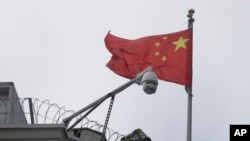A Chinese cancer researcher accused of hiding her ties with the Chinese military on her visa application was taken into U.S. custody overnight in California.
Online records from Sacramento County Main Jail showed that the researcher, Tang Juan, is now in custody without the option of bail.
Lauren Horwood, a spokeswoman for the U.S. attorney's office in Sacramento, confirmed Tang's arrest with Voice of America.
Tang "was a fugitive from justice until last night," a senior Justice Department official said, but has now been charged in Sacramento and was expected to make an appearance in court later Friday.
Horwood told VOA she's waiting for more information on the case.
Tang is one of four Chinese individuals charged with visa fraud in connection with a scheme to lie about their status as members of the People’s Liberation Army. She was interviewed by FBI agents for possible visa fraud on June 20 and fled into the Chinese Consulate in San Francisco afterward. Police arrested her overnight but declined to discuss the circumstances of how she was detained.
Tang, 37, is accused of concealing her membership in China’s military in seeking permission to work in a radiation oncology lab at the University of California-Davis.
According to a statement by UC-Davis, Tang’s work at the school was based in the research laboratory. It said she left the university at the end of June.
“Tang was a visiting researcher in the Department of Radiation Oncology, funded by the Chinese Scholarship Council, a study-based exchange program affiliated with China’s Ministry of Education and Xijing Hospital in China,” the statement said.
Three other individuals were also charged Thursday for hiding their ties with the Chinese military to seek research or study opportunities in the U.S.
Wang Xin, who was arrested June 7, was a researcher at the University of California-San Francisco before acknowledging he had made false statements about his ties with the Chinese military during his interview with U.S. customs officials.
The other two individuals, Song Chen, a researcher on a J-1 visa at Stanford University, and Zhao Kaikai, a graduate student at Indiana University majoring in machine learning and artificial intelligence, were both arrested and accused of concealing their ties with the Chinese military in their visa applications.
John Brown, the executive assistant director of the FBI’s National Security Branch, said Thursday that the agency had identified visa holders in more than 25 American cities with hidden affiliations with the Chinese military.
Orville Schell, director of the Center on U.S.-China Relations at the Asia Society, said that these actions on the U.S. side are all part of a rapidly decaying, spiraling relationship between the U.S. and China, but it’s not without cause.
“I think China has been doing some things that finally the United States is reacting against,” he said, adding that the consequences were going to be quite serious.
U.S. intelligence officials warn that America’s world-class university system has become a soft target in the global espionage war with China, accusing Beijing of deliberately targeting sensitive technologies in the U.S. and using them to modernize China’s military to the detriment of U.S. national security.
U.S. President Donald Trump signed an executive order in late May to cancel visas of Chinese graduate students in the U.S. with ties to the People’s Liberation Army.
Monica Xu of VOA’s Mandarin service contributed to this report.




